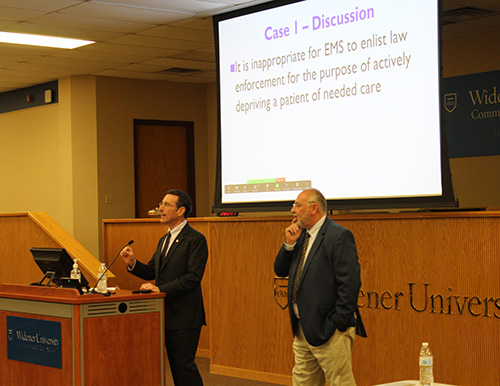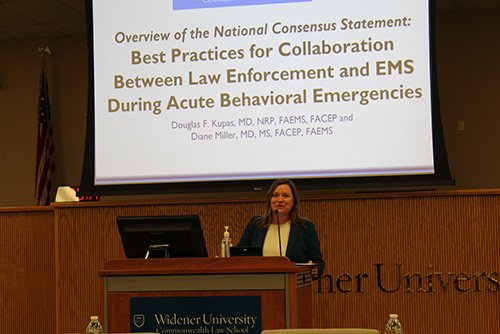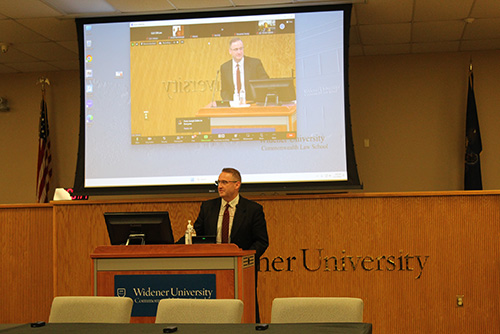
Sixth Annual EMS Symposium Explores Medical Civil Rights in Emergency Services
The sixth annual Widener University Commonwealth Law School Emergency Medical Services Law & Policy Symposium, held on Nov. 7 addressed the intersection of EMS and law enforcement, focusing on the medical rights of individuals in police custody. This year’s theme, "Medical Civil Rights in Emergency Services," examined the legal and ethical responsibilities of EMS and law enforcement to provide timely and competent care.
Speaking at the event, Attorney General Michelle Henry, a 1994 Widener Law Commonwealth alumna, highlighted the urgent need for discussions on EMS and law enforcement responsibilities. “The intersection of law enforcement and public health is vital,” Henry said. “Ongoing discussions like this ensure justice and accountability in our communities.”

Shared Responsibilities in Emergency Care
Law school alumnus and attorney Doug M. Wolfberg ’96, founding partner of Page, Wolfberg & Wirth, LLC, and a member of the Widener University Board of Trustees, and his brother Mark A. Wolfberg, a former police officer and chief, discussed shared responsibilities between EMS and law enforcement. They addressed accountability, appropriate care, and professional standards, using recent cases to emphasize the need for clear role delineation.
“Each field has its own standards and protocols,” said Mark Wolfberg. “EMS should not direct law enforcement, just as law enforcement should not dictate medical care.”

Doug Wolfberg added, “It’s our duty to act based on the patient’s clinical needs, regardless of custody status.”
Ethical Considerations and Historical Context
Dr. Douglas F. Kupas, an EMS physician, provided historical context, noting that Dr. Samuel Mudd treated Lincoln’s assassin, John Wilkes Booth, underscoring the ethical duty to care for all. “This is the essence of the medical profession—helping all people, regardless of their past,” Kupas said.
The symposium also addressed ethical and legal lessons from high-profile cases, including Elijah McClain’s. Shana Beggan and Mike Pellow, both defense counsel in McClain’s case, shared insights on the challenges of handling cases under media scrutiny.
Collaboration for Future Action
The event emphasized the need for enhanced, scenario-based training to strengthen coordination between EMS and law enforcement. “Lives depend on our ability to act seamlessly,” Doug Wolfberg stressed.

Attorney General Henry expressed hope for future reforms led by Widener law students, while Dean andré douglas pond cummings emphasized the school’s commitment to meaningful legal discussions on medical civil rights in emergency services. “Widener Law Commonwealth is proud to engage with issues nationally significant and relevant to our community,” he said.
